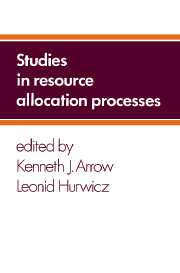Book contents
- Frontmatter
- Contents
- Preface
- Acknowledgments for reprinted articles
- PART I General introduction
- The design of resource allocation mechanisms
- PART II Economies with a single maximand
- PART III Economies with multiple objectives
- PART IV General characterizations of allocation processes
- Appendix: An optimality criterion for decision-making under ignorance
- Author index
- Subject index
- Index of examples
The design of resource allocation mechanisms
Published online by Cambridge University Press: 04 April 2011
- Frontmatter
- Contents
- Preface
- Acknowledgments for reprinted articles
- PART I General introduction
- The design of resource allocation mechanisms
- PART II Economies with a single maximand
- PART III Economies with multiple objectives
- PART IV General characterizations of allocation processes
- Appendix: An optimality criterion for decision-making under ignorance
- Author index
- Subject index
- Index of examples
Summary
Traditionally, economic analysis treats the economic system as one of the givens. The term “design” in the title is meant to stress that the structure of the economic system is to be regarded as an unknown. An unknown in what problem? Typically, that of finding a system that would be, in a sense to be specified, superior to the existing one. The idea of searching for a better system is at least as ancient as Plato's Republic, but it is only recently that tools have become available for a systematic, analytical approach to such search procedures. This new approach refuses to accept the institutional status quo of a particular time and place as the only legitimate object of interest and yet recognizes constraints that disqualify naive Utopias.
A wealth of ideas, originating in disciplines as diverse as computer theory, public administration, games, and control sciences, has, in my view, opened up an exciting new frontier of economic analysis. It is the purpose of this paper to survey some of the accomplishments and to consider outstanding unsolved problems and desirable directions for future efforts.
It is not by accident that the terms “analytical” and “institutional” were only a few words apart in the preceding statement of scientific goals of our inquiry. In the past, especially in the nineteenth century, cleavage developed between analysts who tended to focus on the competitive and monopolistic market models and institutionalists who, either as historians or as reformers, felt the need for a broader framework, but found the existing analytical tools inadequate for their purposes.
- Type
- Chapter
- Information
- Studies in Resource Allocation Processes , pp. 3 - 38Publisher: Cambridge University PressPrint publication year: 1977
- 14
- Cited by



